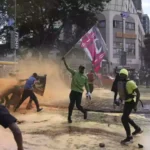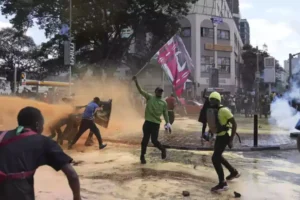Once again, the Nigerian Broadcasting Commission imposed a heavy-handed fine on Channels TV, following a petition by an aide of Bola Tinubu. Ironically, the petition was based on some comment by the Labour Party vice presidential candidate Datti Baba-Ahmed who, during a live interview, said something to the effect that swearing Tinubu into office in May would “end” democracy in Nigeria. This not-so-subtle manipulation of a state agency by the aides of an incoming president signals a pattern of power abuse that will only worsen.
Baba-Ahmed was wrong to the extent he assumed that swearing in the beneficiary of a flawed election would be the death of Nigeria’s democracy. No, that is not how the end will come. Democracy will be squelched to death in the hands of executioners claiming statesmanship; its end will be from the chokehold of maniac politicians whose bid to make the polity conducive for their characteristic lawlessness will drive them to use the instruments of democracy to undermine democracy.
If their obsessive focus with the Labour Party presidential candidate and his followers in the aftermath of the election process proves anything, it is that these declared winners are bothered. The resolute existence of the Obi-dients delays—and therefore denies—the legitimacy of the APC. That is why, though they won an election, they can hardly settle to enjoy their victory. They remain stuck on their opponent’s popularity. So acutely are these supposed winners unsettled by the Obi-dients, an army of self-motivated political contenders with a narrative capacity that substantially upends the Tinubu propaganda machine, that they are not even discussing the future under their government. Their mad preoccupation with making the Obi-dients go away will drive them to break many things, chief of which will be democracy itself.
Unfortunately, they will be indulged by agencies like the NBC who, like most Nigerian public institutions, lack autonomy. The NBC’s media arbitrating activities tend towards a studious calculation of partisanship politics that favour them personally rather than any well-considered principles of how media houses in a democratic society should run. Previously, I have pointed out the anachronism of agencies like the NBC in the age of liberalised media and global media technology. Their duties were meaningful in bygone eras when the government controlled the media and when the military ran the country.
The NBC code made sense at the time because you could rightly claim that since most people were exposed to a narrow range of media options, it was possible to manipulate society.
Now we live in an era where people’s media options are not only endless, but audience-ship itself has become quite fragmented. Hardly any media can claim primary influence over public opinion. The agenda-setting feature of the media is easily contested now, and the traditional ways we imagine media influence have changed forever. Communication is no longer between the media houses and the people sitting inside their homes watching TV or listening to the radio. The world we live in now is overrun with infinite sources of information, a chaotic field of endless chatter where people are more energised to talk than even listen.
Despite all these massive shifts happening in the media, the NBC insists on micromanaging media content (and even for private enterprises). To an extent, the high-handed manner they hand out fines to media houses based on some nebulous idea of what threatens the polity suggests they struggle with re-imagining their relevance in the 21st century. When you hear some NBC officials speak on their expectations of media “objectivity,” you know these guys are still stuck on old ideas. They are still regurgitating textbooks written by dead white guys (whose scions have long revisited those old ideas in the light of new realities!).
Source : Punch
















